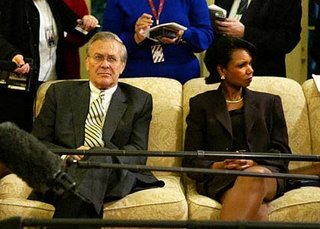When Rhetoric Is Not Reality
I am struck in recent weeks more than ever by rhetoric and news coming out of Washington that is eerily similar in tone and even in content to that of the turbulent Vietnam and Watergate era. I had hoped, for one, never to revisit those days, which were marked by polarizing name-calling, strident misogyny, and political skullduggery.
 This week, just for example, we have political pundit Ann Coulter dissing pro-immigration demonstrations across the country by jokingly (in her mind) complaining she didn’t get clean towels in her hotel room that morning. We have Secretary of Defense Donald Rumsfeld saying that Secretary of State Condoleezza Rice “doesn’t’ understand the nature of war.” We have former House Majority Leader Tom DeLay dissing Hilary Clinton by saying “Who likes a know-it-all woman.” And we even have accusations that the President of the United States has authorized the leaks of classified information to reporters to further his own political agenda, an accusation which if it gains feet in the press and in the blogosphere will make Monicagate and Watergate pale in comparison. As if that weren’t enough, we even have the politicians blaming the press for the bad news coming out of Iraq, with some questioning the integrity and patriotism of the media.
This week, just for example, we have political pundit Ann Coulter dissing pro-immigration demonstrations across the country by jokingly (in her mind) complaining she didn’t get clean towels in her hotel room that morning. We have Secretary of Defense Donald Rumsfeld saying that Secretary of State Condoleezza Rice “doesn’t’ understand the nature of war.” We have former House Majority Leader Tom DeLay dissing Hilary Clinton by saying “Who likes a know-it-all woman.” And we even have accusations that the President of the United States has authorized the leaks of classified information to reporters to further his own political agenda, an accusation which if it gains feet in the press and in the blogosphere will make Monicagate and Watergate pale in comparison. As if that weren’t enough, we even have the politicians blaming the press for the bad news coming out of Iraq, with some questioning the integrity and patriotism of the media.  All of the above is Vietnam and Watergate redux. Or, as Yogi Berra so famously said, “This is like deja vu all over again."
All of the above is Vietnam and Watergate redux. Or, as Yogi Berra so famously said, “This is like deja vu all over again."One nice thing, though, something that makes a huge and positive difference between then and now, is you don’t have to take my word for any of this. Thanks to the Internet, and particularly to the blogosphere, you can find out for yourself if the media is truly liberal. Or if you don’t quite trust the blogosphere, you can use LexisNexis to track stories for yourself and see if there is consistent information to support a particular view or statement. In short, sitting at home or in a library with Internet access, you can separate rhetoric from reality.
For example, several weeks ago the President was asked why the Pentagon had delayed sending new robotic technology to Iraq to help American troops find and disarm IEDs. Instead of answering the question, the President replied that the press was acting irresponsibly, even helping our enemies, by asking such questions because the question gave away classified information (for a view of the present climate of hypocritical rhetoric such as this, see today’s breaking news). Naturally his handpicked, friendly audience loved his response. Problem was, there was nothing classified about the information, not to mention that the issue had been widely reported a month earlier.
But that is rhetoric for you – it doesn’t have to match reality to pose a good argument. Unless of course you view, as I do, an argument as an exercise in the presentation of an honestly researched point of view. In other words, in an ethical argument, as all should be, rhetoric must match reality.


1 Comments:
Good observations. I overwhelmingly agree with you. I would only argue that all political communcation is rhetoric in the cynical, political sense.
To me, what makes the Bush Administration's rhetoric so fundamentally troublesome and different than, say, Clinton and Reagan is the outright obstinacy and disregard for the public's right know. As you write, the Bush communication strategy often blames the press first, avoiding the question-at-hand.
Robert Scheer has a great book about politics from Nixon to George W. Bush, in which he discusses how, no matter what incorrect or scandalous policies and behavior he found with previous administrations, he still respected the eagerness of these presidents and staffs debate issues and answer questions. His conclusion-- with Bush and his staff there is no debate, there are no answers.
I'm also reminded of Bob Woodward's book, Shadow, which discusses the irreversible damage of Watergate, but also the power and opportunity this event provided the press with.
Post a Comment
<< Home